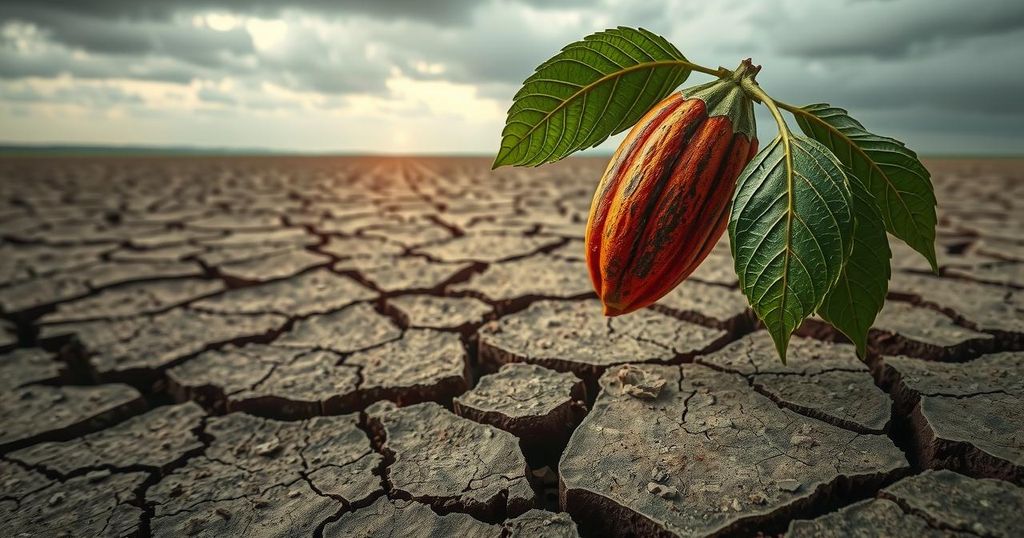The Impact of Climate Change on Global Cocoa Production and Chocolate Prices

Climate change is critically impacting cocoa production in West Africa, with rising temperatures disrupting optimal growing conditions. A report indicates a significant rise in extreme heat affecting yields, contributing to skyrocketing cocoa prices and threatening the livelihood of farmers. Urgent collective action is needed to combat these changes and ensure sustainable cacao production.
Climate change is significantly affecting cocoa production in West Africa, crucial for global chocolate supplies. Temperatures in this region, which contributes about 70% of the world’s cacao, have risen due to climate change, leading to detrimental effects on agricultural yields. Farmers face numerous challenges, including heat stress, disease outbreaks, and erratic rainfall patterns, which have collectively resulted in decreased cocoa output and skyrocketing prices.
A report from Climate Central highlights that climate change, primarily caused by fossil fuel emissions, has increased the frequency of higher temperatures in Ivory Coast, Ghana, Cameroon, and Nigeria. Notably, the situation is most precarious in Ivory Coast and Ghana, with substantially more hot days impacting the optimum growing conditions for cacao. Over the past decade, the study indicated that these countries experienced about three additional weeks of extreme heat during the growing season each year.
The research demonstrated that last year, recorded as the warmest globally, featured temperatures exceeding 32 degrees Celsius on at least 42 days in many surveyed areas, adversely affecting both the quality and quantity of cocoa produced. Additionally, other compounding issues, such as insect infestations and unlawful mining activities, have further exacerbated the situation.
Christian Aid provided an analysis on the vulnerability of cacao farmers to changing weather conditions attributed to climate change. They reported extreme weather oscillations, from excessive rain damaging crops in 2023 to drought conditions forecasted for 2024. Osai Ojigho, the director at Christian Aid, remarked on the significant threat to the livelihoods of cocoa farmers, many of whom are among the poorest globally, stating, “Growing cocoa is a vital livelihood for many of the poorest people around the world and human-caused climate change is putting that under serious threat.”
The drastic reduction in harvests has created significant fluctuations in cocoa prices, which surged from approximately $2,000 to $3,000 per tonne for many years to over $10,000 per tonne recently. Swiss chocolate maker Lindt & Spruengli announced adjustments to their prices to cope with rising cocoa costs due to the shrinking supply.
Narcisa Pricope, a distinguished professor at Mississippi State University, expressed concerns regarding the long-term viability of cacao cultivation, indicating it faces an “existential threat” from ongoing dry conditions exacerbated by climate change. She referenced a UN study revealing that over three-quarters of the Earth has become drier in the last three decades, attributing this phenomenon largely to greenhouse gas emissions. Furthermore, Pricope underscored the urgent need for collective action to combat aridity, emphasizing, “Collective action against aridity isn’t just about saving chocolate – it’s about preserving the planet’s capacity to sustain life.”
In summary, climate change poses severe challenges to cocoa production in West Africa, impacting the global chocolate supply chain profoundly. Increased temperatures and erratic weather patterns threaten farmers’ livelihood, leading to rising cocoa prices. Urgent actions are necessary to address these environmental issues to ensure the viability of cacao production and protect the livelihoods of millions in the region.
Original Source: www.sciencealert.com






